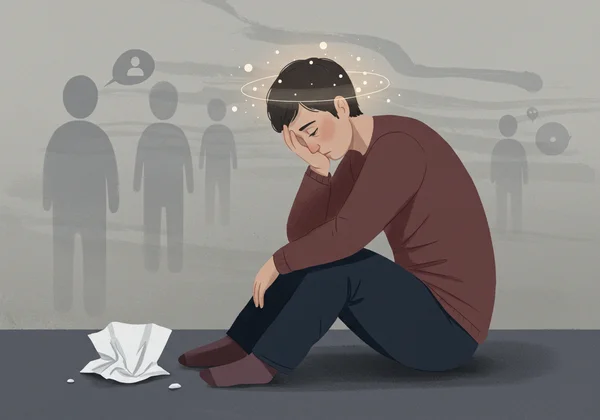HSP Test for Burnout: Signs of Emotional Exhaustion & Strategies for Recovery
September 2, 2025 | By Eleanor Reed
Feeling constantly drained, overwhelmed, and suspecting it's more than just everyday stress? For Highly Sensitive People (HSPs), chronic overstimulation can lead to a specific form of deep exhaustion known as HSP burnout. This state feels like running on empty, where your mind, body, and spirit are depleted. What are the signs of a highly sensitive person experiencing burnout? This guide will help you identify the unique signs and provide actionable strategies for recovery, starting with understanding your unique traits, and consider how an HSP test can provide clarity and a path to recovery through an official HSP test.
Understanding HSP Burnout & Overstimulation
HSP burnout isn't just about feeling tired; it's a profound state of emotional, physical, and mental exhaustion. It stems from the core of the highly sensitive trait: a nervous system that processes stimuli deeply and intensely. When you are constantly absorbing sensory details, emotional cues, and subtle environmental shifts without adequate downtime, your system becomes overloaded. This isn't a weakness; rather, it's the natural outcome of a finely tuned system pushed beyond its limits.
Distinguishing HSP Burnout from General Stress
While everyone experiences stress, HSP burnout has distinct characteristics. General stress is often tied to specific, identifiable pressures and may resolve when the stressor is removed. In contrast, burnout for an HSP is a cumulative state of sensory and emotional overload. It can feel like a complete system shutdown, where even minor tasks feel monumental. You might notice that your usual coping mechanisms are no longer effective, and the feeling of being overwhelmed is pervasive, not just situational.
The Impact of Sensory Overload on Highly Sensitive People
For HSPs, the world is a symphony of details that others might miss. This can be a source of great joy and creativity, but it also makes you vulnerable to sensory overload. Loud noises, bright lights, strong smells, and even the emotional energy of a crowded room can quickly fill your "sensory cup." When this cup overflows continuously, your nervous system triggers a defense mechanism: burnout. It’s the body’s way of saying, "I can't process any more information," forcing you to retreat and recover. Recognizing this is the first step toward managing your sensitivity effectively.

7 Key Signs of Emotional Exhaustion in HSPs
If you're wondering whether you're experiencing HSP emotional exhaustion, these seven signs can provide clarity. They reflect the unique ways high sensitivity manifests under chronic stress.
Heightened Sensory Sensitivity and Irritability
When you're approaching burnout, your already high sensitivity can go into overdrive. The gentle hum of the refrigerator might suddenly sound like a jet engine. The tag on your shirt feels unbearably scratchy. This hyper-awareness often leads to increased irritability, as you struggle to cope with the sensory onslaught.
Profound Emotional Overwhelm & Mood Swings
HSPs are known for their deep emotional responsiveness. During burnout, this empathy can turn inward, leading to intense emotional overwhelm. You might find yourself crying unexpectedly or experiencing rapid mood swings that feel out of your control. The emotional weight of the world, which you normally carry with compassion, can suddenly feel crushing.
Persistent Physical Fatigue & Ailments
Emotional and sensory overload take a significant physical toll. This isn't just feeling tired; it's a bone-deep weariness that sleep doesn't seem to fix. Many HSPs in burnout also report physical symptoms like chronic headaches, digestive issues, and a weakened immune system, as the body struggles to manage the constant state of high alert.
Social Withdrawal and Avoidance
Socializing requires immense energy for an HSP, as you process not only conversations but also non-verbal cues and group dynamics. When you're burnt out, the thought of social interaction can be completely draining. You may find yourself canceling plans, avoiding phone calls, and seeking isolation as a way to protect your depleted energy reserves.
Difficulty Concentrating and Brain Fog
Your deep processing trait is a superpower, enabling you to think critically and connect ideas profoundly. However, burnout short-circuits this ability. You might experience "brain fog," making it difficult to focus, remember details, or make decisions. Simple mental tasks can feel like wading through thick mud as your brain begs for a break.
Feeling Disconnected or Apathetic
A deeply unsettling sign of HSP burnout is a sense of detachment or apathy. You might feel disconnected from your own emotions, your passions, and the people you love. This emotional numbness is a protective mechanism to stop the influx of overwhelming feelings, but it can leave you feeling empty and unlike yourself.
Increased Need for Intense Solitude
While HSPs naturally need more alone time than others, the need during burnout becomes urgent and intense. It's not just a preference; it feels like a biological necessity. You may crave complete silence and solitude for extended periods simply to feel a semblance of balance and to begin the process of hsp overstimulation recovery.

Your Recovery Plan: Overcoming HSP Overstimulation & Exhaustion
Recovering from burnout is not about "toughing it out." It's about fundamentally shifting your approach to honor your sensitive nature. If these signs resonate with you, taking an HSP test (or a highly sensitive person test) can be a validating first step.
Prioritizing Nervous System Regulation for HSPs
Your primary goal during recovery is to calm your overstimulated nervous system. This means actively engaging in activities that shift you from a "fight-or-flight" state to a "rest-and-digest" state. Practices like deep breathing exercises, gentle yoga, meditation, or spending quiet time in nature can be incredibly restorative. These aren't luxuries; they are essential tools for your well-being.
Setting Healthy Boundaries (Without the Guilt)
HSPs often struggle with boundaries because they feel others' disappointment so keenly. However, boundaries are crucial for preventing burnout. Learning to say "no" to draining commitments, limiting exposure to overwhelming people or environments, and scheduling non-negotiable downtime are acts of self-preservation. Remember, protecting your energy allows you to show up more fully when you choose to.
Creating a Restorative & Sanctuary Environment
Your home should be your sanctuary—a place where your nervous system can truly rest. Minimize clutter, use soft lighting, incorporate calming scents with essential oils, and reduce noise. Create a "cocoon" space—a cozy corner with a soft blanket and a good book—where you can retreat when the world feels like too much. This intentional environment provides a buffer against external chaos.

Reconnecting with Your Strengths & Joys
Burnout can make you forget who you are beyond the exhaustion. A key part of recovery is slowly re-engaging with the activities that nourish your soul. This could be creative pursuits like painting or writing, listening to beautiful music, or spending one-on-one time with a trusted friend. Rediscover what makes you feel alive and connected, and remember that your sensitivity is the source of these deep joys.
Moving Beyond Burnout: Embrace Your Sensitive Strength
HSP burnout is a clear signal that your environment and lifestyle are out of sync with your innate temperament. Instead of battling your sensitivity, this burnout is an invitation to embrace and work with your unique wiring. By recognizing the signs of emotional and sensory overload, you can take proactive steps to create a life that honors your needs and celebrates your strengths.
Understanding your trait is the foundation of this journey. If you haven't already, take our comprehensive HSP test to discover your sensitivity. It provides the clarity needed to embrace your sensitive strength and move from a state of exhaustion to one of empowerment.

Frequently Asked Questions About HSP Burnout & Recovery
What causes a highly sensitive person to burn out?
Burnout in HSPs is primarily caused by chronic overstimulation. This happens when the nervous system is consistently overwhelmed by sensory input (noise, light), emotional data (empathy, conflict), and deep cognitive processing without sufficient time for rest and integration. A lack of boundaries and not living in alignment with one's sensitive needs are also major contributing factors.
How can HSPs prevent future emotional exhaustion?
Prevention involves building a sustainable lifestyle. Key strategies include scheduling regular downtime, practicing nervous system regulation techniques, setting firm boundaries, curating a calming home environment, and understanding your personal limits. Knowing your triggers after taking an HSP quiz is crucial for proactive energy management.
Do highly sensitive people need more sleep for recovery?
Yes, many HSPs find they need more sleep than average, especially during recovery from burnout. Sleep is when the brain processes the day's information and the body repairs itself. Because HSPs take in so much more data, their brains and bodies often require extra time to complete this vital restorative process.
Is HSP burnout the same as clinical depression?
While they can share overlapping symptoms like fatigue, social withdrawal, and apathy, they are not the same. HSP burnout is a state of exhaustion resulting from overstimulation, whereas clinical depression is a mood disorder with specific diagnostic criteria. However, chronic burnout can increase the risk of developing depression. If you suspect you have depression, it is essential to consult a qualified healthcare professional. This article is for informational purposes only and is not a substitute for professional medical advice.
How do I confirm if I am an HSP?
The most reliable way to confirm the trait is by taking a scientifically grounded assessment. The HSP test (or test for hsp) on our website is based on the research of Dr. Elaine N. Aron, the psychologist who pioneered the concept of the Highly Sensitive Person. It can provide valuable insights and validation for your experiences.